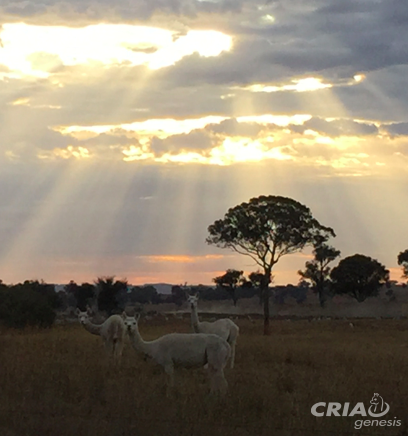Veterinarian Dr Robert Van Saun, from PennState University, has written a comprehensive article on selenium (Se) supplementation in camelids which can be read here. Dietary Se content issues in camelids are yet to be resolved, however, the currently recommended daily intake of oral Se is between 0.74 and 1 mg/day/animal (note: the amount is up to 1 mg Se orally per animal per day). This may be eaten in Se-adequate pasture or hay, but in areas where soil, pasture and hay are deficient, Se may be supplemented to alpacas either in a loose mineral lick or using an injectable supplement.
Different commercially available mineral licks contain different levels of Se in them, and overall intake is regulated by salt content. If, for example, an oral mineral lick contained 90 mg Se/kg mineral lick, (the equivalent of mg/kg in US terms used in Dr Van Saun’s article is ppm = parts per million) then the camelid would need to ingest approximately 11 grams of mineral lick per day to ingest 1 mg Se. Enough salt is added to the mineral mix to deter any animal from ingesting too much of the mineral mix on any one day.
I am currently undertaking a study on injectable selenium supplementation in alpacas in conjunction with Regional Laboratory Services in Victoria. The study thus far indicates that alpacas should only be injected subcutaneously with barium selenate, a depot product designed to release Se slowly into the system over a period of 12 months. Alpacas that were tested deficient in blood selenium and glutathione peroxidase (an enzyme that contains Se and can be used as a marker of Se sufficiency in livestock) were supplemented with barium selenate subcutaneously in June 2015. One month after injection, blood levels had risen to adequate concentrations, and 9 months into the study, alpacas still have adequate blood Se concentrations. Watch this space in June for a 12 month update. The findings will be published when final samples have been tested.
Do not inject camelids with either sodium selenate or sodium selenite as the Se in this format is rapidly absorbed and has caused acute liver failure (death in < 24 hours) in at least one alpaca in Australia. This case report is currently being written up for publication.
Avoid using 5-in-1 vaccines and worm drenches containing Se if you are supplementing Se orally or by depot Se injection to avoid over-dosing your animals with Se. Too much selenium is toxic and will kill your animals.


